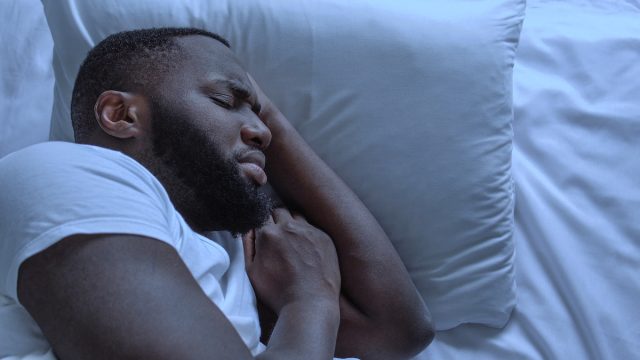The 8 Most Common Recurring Dreams, According to Data

If you’ve ever had a recurring dream, you might worry that something’s amiss, especially if it’s a nightmare you keep having. But according to a recent study by Amerisleep, it’s not all that unusual. The mattress retailer surveyed over 2,000 people across the U.S., 49.9 percent male and 50.1 percent female, ranging from ages 18 to 74. Of the participants, 25 percent said they’d never had a recurring dream. The others’ responses, however, revealed that certain themes are quite common.
“Recurrent dreams are a reflection of the brain’s self-cleaning process while processing important psychological needs and frustrations,” explains professional dream interpreter Masha Loddy. And since so many of us deal with similar stresses and life changes, it’s no wonder the study pinpointed specific trends.
Keep reading to learn what the most common recurring dreams are and hear from experts about what they mean.
READ THIS NEXT: The Secret Meaning of 60 Common Dreams.
8
Being lost

Dreams about being lost occurred for 27.1 percent of the survey participants.
“This is most often associated with feeling directionless in real life, not knowing ‘which way to go’ when needing to make a decision,” explains Lauri Loewenberg, professional dream analyst and author of Dream on It: Unlock Your Dreams Change Your Life. She adds that this dream is common among individuals who have just retired and may feel they don’t yet have a clear direction for this phase of their life.
And since this is a dream related to finding a resolution, it could go on longer than others. Loewenberg says that we get recurring dreams for two main reasons. The first is that the dream is connected to an ongoing issue. “For as long as the issue continues, so does the dream.” The second is that “the dream is connected to a recurring behavior pattern or recurring behavior response.” She notes that whenever we exhibit this behavior—say speaking nervously to one’s spouse about a retirement plan—we’re likely to have the dream.
7
Having your teeth fall out

Nearly tying with being lost is losing your teeth, as 27.3 percent of those surveyed say they’ve regularly had this scary dream.
“Dreams that involve any part of the mouth are usually connected to communication issues in real life, teeth being the most common part of the mouth we dream about,” says Loewenberg. “Teeth are meant to remain fixed in our mouth, so when they fall out in a dream it is most often the side effect of loose speech in real life: allowing something out of our mouth that should have stayed put!”
Loewenberg adds that, though it’s less common, she’s also seen this dream brought on by feeling helpless. “It points back to feeling powerless due to an inability to express yourself verbally.”
READ THIS NEXT: If You Dream About This, Call Your Doctor Immediately.
6
Mortality

According to Breanna Auray, sleep health content specialist at MattressClarity, while dreams about death can be unsettling, “they could represent that you are experiencing a new beginning or change in your life.” This is probably welcome news to the 29.5 percent of respondents who’ve had this dream.
However, new beginnings are usually connected to endings. “Death is the end of life, but to the subconscious dreaming mind, death is the end of ‘life as you now know it,'” explains Loewenberg. “Our dreams show us the changes and endings in our life in the form of a death so that we can let go of what is no more, what is no longer viable within us or around us so that we can make room for what is to come, so that we can grow or move on.”
If you dream that someone close to you dies, it could reflect what’s happening in your relationship with that person. For example, Loewenberg says it’s very common for parents to dream that a child dies. “These dreams tend to happen when the child is reaching a milestone: when they learn to crawl, when they start school, when they start dating, etc. Each milestone is the end of a phase of life and therefore shows up in our dreams as a death.” And the grief felt in these dreams mirrors that which a parent may feel when their child is growing up.
5
Flying

Most experts concur that these dreams—which 32.6 percent of respondents said they have—are a good thing!
“Flying dreams are the most common dream that we have as children, but they tend to taper off as we get older, as life gets harder and as we lose our childlike imagination,” according to Loewenberg. “Typically, the message of this dream is: things are great right now; the sky is the limit. Keep doing what you’re doing.”
Surprised that children also have recurring dreams? Nearly 39 percent of those surveyed said their recurring dreams first started in childhood. Another 21 percent said they began during adolescence, while only 15 percent didn’t get them until adulthood.
For more wellness news sent directly to your inbox, sign up for our daily newsletter.
4
Being unprepared for a test or important event

Dreams about not having studied for a big exam may actually begin later in life. “I’ve found that the time pressure of these dreams is also a big clue as to what they are connected to in waking life,” says Loewenberg. “Basically, I need to accomplish X before it’s too late.”
For the 34 percent of survey participants having these dreams, the best way to head them off is to figure out what’s making you feel this kind of time pressure. Do you have a big deadline at work? Is your family pressuring you to get married or have children? If you can mitigate the stress of these instances during the day, you’ll be less likely to have this anxiety-producing dream.
Interestingly, but perhaps not surprisingly, advertisers, journalists, and college professors—”those who communicate for a living,” according to the study—dream most often about being unprepared for a test.
3
Being back in school

Similar to being unprepared for a test, 37.9 percent of those surveyed dream about being back in school. But they, too, are more connected to our adult responsibilities like jobs and career paths. “School is our first job. All the same pressures of job and career,” points out Loewenberg.
School is also the first place we deal with peers and friends, so it’s common for this dream to come up if you’re feeling pressure from your social circle.
“Compare the thoughts and emotions you had in your school dream to the thoughts and emotions you have about your job or social situation. See the similarities? There is probably some unpreparedness, uncertainty, or even vulnerability that needs to be addressed,” says Loewenberg.
READ THIS NEXT: 5 House Plants That Will Help You Sleep, Experts Say.
2
Being chased

For the 50.9 percent of respondents having this nightmare, avoidance in daily life is the key.
“Running from something or someone in a dream happens when we don’t handle something right away, nip it in the bud, and end it,” explains Loewenberg. “People who tend to avoid confrontation at all costs get this dream a lot.”
Loewenberg says to pay close attention to who or what is behind you, chasing you. “Ask yourself what you are trying to put behind you right now. Is there something from your past you are trying to get away from?”
1
Falling

The most common recurring dream is falling, with 53.5 percent of the participants having it regularly.
According to Loewenberg, dreaming about falling is often caused by real-life letdowns and disappointments: “Things we had high hopes for, falling through or falling apart, or when something in our life is going in the wrong direction.” It can also occur when we feel a lack of financial or emotional support.
Like the other anxiety-induced dreams on this list, it’s important to confront the real-life issues to curb the nightmares.
“Chances are, if you give the dream your full attention, one of two things will happen: Either, it will go away, or it will change,” according to Tzivia Gover, certified dreamwork professional and author of The Mindful Way to a Good Night’s Sleep. If the latter occurs, Gover says it’s often a sign that you’re making emotional progress.
“Keep working with the dream, paying close attention to any alterations in the repeating pattern,” adds Gover. “You may even start to welcome the reappearance of this dream theme because the ways it changes will give you clues as to where your daytime attitudes and actions need tweaking.”